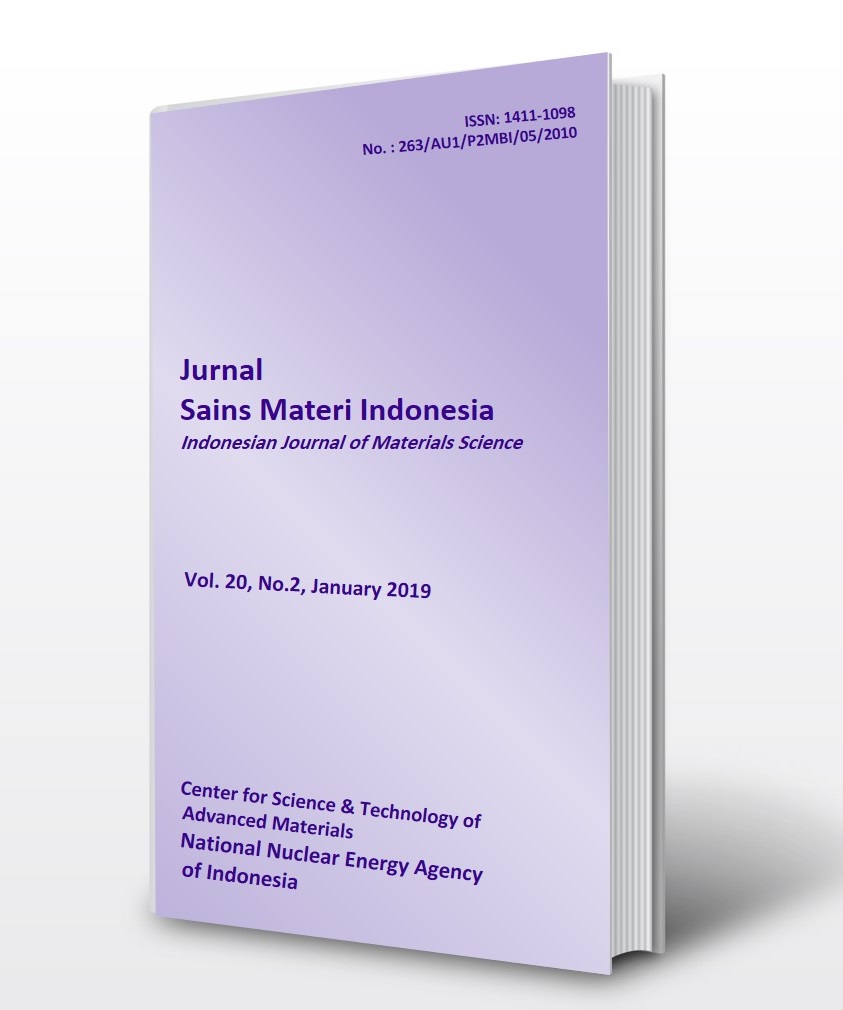The Effect of Conventional and Sonochemical Synthesis Methods on Gd2O3 Nanoparticles Properties
Keywords:
Gd2O3 Sonochemical Paramagnetic MRIAbstract
Paramagnetic Gd2O3 nanoparticles have been widely used as a contrast agent in bioimaging such as Magnetic Resonance Imaging (MRI). In this study, Gd2O3 nanoparticles were prepared using conventional and sonochemically precipitation methods, without any stabilizers. Gadolinium nitrate was used as a precursor and ammonium hydroxide as precipitating agent. The synthesized Gd2O3 nanoparticles were characterized using X-Ray Diffractometer (XRD), Particle Size Analyzer (PSA), Scanning Electron Microscope (SEM), and Vibrating Sample Magnetometer (VSM). It was found that Gd2O3 nanoparticles obtained in both methods have a cubic phase. The saturation magnetization (Ms) values of conventional and sonochemical samples were 1.63 emu/g and 1.44 emu/g respectively. The morphology of both samples shows agglomerated spherical shape in the nanometer range. The nanoparticles size of Gd2O3 that was confirmed by the Dynamic Light Scattering technique show samples from the sonochemical method has narrower size distribution (higher homogeneity) compare to samples from the conventional method. It was also found that the sonochemical synthesis technique is faster (time-saving), simple, convenient, and environmentally benign.Downloads
References
S. Kumar, V. K. Meena, P. P. Hazari, S. K. Sharma, and R. K. Sharma. “Rose Bengal Attached and Dextran Coated
Gadolinium Oxide Nanoparticles for Potential Diagnostic Imaging Applications,” Eur. J. Pharm. Sci., 2017.
Z. Hu, M. Ahren, L. Selegard, C. Skoglund, F. Sçderlind, M. Engstrçm, X. Zhang, and K. Uvdal. ”Highly WaterDispersible Surface-Modified Gd2O3 Nanoparticles for Potential Dual-Modal Bioimaging," Chem. Eur. J., vol. 19,
no. 38, pp. 12658-12667, 2013.
M. Aghazadeh "Preparation of Gd2O3 Ultrafine Nanoparticles by Pulse Electrodeposition Followed by Heattreatment Method," J Ultrafine Grained Nanostruct Mater, 49, no. 2, pp. 80-86, 2016.
N. Sakai, L. Zhu, A. Kurokawa, H. Takeuchi, S. Yano, T. Yanoh, N. Wada, S. Taira, Y. Hosokai, A. Usui, Y.
Machida, H. Saito and Y. Ichiyanagi. "Synthesis of Gd2O3 Nanoparticles for MRI Contrast Agents," J. Phys.: Conf.
Ser., vol. 352, no. 1, p. 012008, Mar. 2012.
M. S. Almeida, M. A. B. Santosa, R. F. Gonçalves, M. R. C. Santosa, A. P. A. Marques, E Longo , F. A. Portad, I.
M. Pinattie, M. D. P. Silvae, and M. J. Godinhoa. "Novel Gd(OH)3 , GdOOH and Gd2O3 Nanorods: MicrowaveAssisted Hydrothermal Synthesis and Optical Properties," Materials Research, vol. 19, no. 5, 2016.
M. Z. A. M. Jamil, F. Mohamed, N. R. A. Rosli, and I A. Rahman. "Synthesis of Cubic Phase Gd2O3 Nanoparticles
Using Hydrothermal Method," J. App. Phys., vol. 9, no. 5, 2017.
T. Q. Bui, H. Thi, M. Ngo, and H. T. Tran. “Surface-protective assistance of ultrasound in synthesis of
superparamagnetic magnetite nanoparticles and in preparation ofmono-core magnetite-silica nanocomposites,” J.
Sci. Adv. Mater. Devices, vol. 3, no. 3, pp. 323–330, 2018.
H Khajuria, J. Ladol, R. Singh, S. Khajuria, and H. N. Sheikh. "Surfactant Assisted Sonochemical Synthesis and
Characterization of Gadolinium Doped Zinc Oxide Nanoparticles," Acta Chim. Slov., vol. 62, no. 4, pp. 849-858,
I. Muneer, M.A. Farrukh, S. Javaid, M. Shahid, and M. Khaleeq-ur-Rahman "Synthesis of Gd2O3/Sm2O3
Nanocomposite via Sonication and Hydrothermal Methods and Its Optical Properties,” Superlattices and
Microstructures, vol. 77, pp. 256-266, 2014.
M. A. Dheyab, A. A. Aziz, M. S. Jameel, P. M. Khaniabadi, and A. A. Oglat, “Rapid Sonochemically-Assisted
Synthesis of Highly Stable Gold Nanoparticles as Computed Tomography Contrast Agents,” Applied Sciences, vol.
, no. 20, p. 7020, 2020.
G. Boopathi 1, S. G. Raj, G. R.h Kumar, and R. Mohan. "Co–precipitation Synthesis, Sstructural and Luminescent
Behavior of Erbium Doped Gadolinium Oxide (Er3+: Gd2O3) Nanorod,” Procedia Materials Science, vol. 6, pp.
-1443, 2014.
D. V. Pinjari and A. B. Pandit. "Room Temperature Synthesis of Crystalline CeO2 Nanopowder: Advantage of
Sonochemical Method Over Conventional Method," Ultrason. Sonochemistry, vol. 18, no. 5, pp. 1118-1123, 2011.
F. Whba, F. Mohamed, N. Ratasha, A. Rosli, and I. Abdul. “The Crystalline Structure of Gadolinium Oxide
Nanoparticles (Gd2O3-NPs ) Synthesized at Different Temperatures via X-ray diffraction (XRD) Technique,”
Radiat. Phys. Chem., vol. 179, p. 109212, 2021.
T. Selvalakshmi and A. C. Bose, “Optical Study on Gadolinium Oxide Nanoparticles Synthesized by Hydrothermal
Method,” Adv. Mat. Res., vol. 585, pp. 105-109, 2012.
S. R. Alam, S. Haghgoob, E. Gorjib, N. R. Alam, and S. Haghgoo. “Size Reproducibility of Gadolinium Oxide
Based Nanomagnetic Particles for Cellular Magnetic Resonance Imaging: Effects of Functionalization,
Chemisorption and Reaction Conditions,” Iran. J. Pharm. Res., vol. 14, no. 1. pp. 3, 2015.
C.H. Chia, S. Zakaria, M. Yusoff, S.C. Goh, C.Y. Haw, Sh. Ahmadi, N.M. Huang, and H.N. Lim. "Size and
Crystallinity-Dependent Magnetic Properties of CoFe2O4 Nanocrystals," Ceramics International, vol. 36, no. 2, pp.
-609, 2010.
A. Dougherty, E. L. Y. Nasution, F. Iskandar, and G. Dougherty, “Journal of Science : Advanced Materials and
Devices Facile Solvothermal Synthesis and Functionalization of Polyethylene Glycol-Coated Paramagnetic
Gd2(CO3)3 Particles and Corresponding Gd2O3 Nanoparticles for Use as MRI Contrast Agents,” J. Sci. Adv. Mater.
Devices, vol. 4, no. 1, pp. 72-79, 2019.
Downloads
Published
How to Cite
Issue
Section
License

This work is licensed under a Creative Commons Attribution-ShareAlike 4.0 International License.








